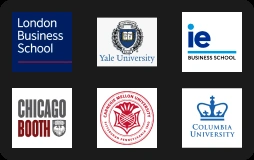
Deferred MBA Programs
Deferred MBA: Everything You Need to KnowDeferred MBA programs are becoming increasingly p…
Table of Contents

Are you considering pursuing your MBA in Germany in 2024? You’re definitely not alone. Germany has quickly become one of the top choices for MBA aspirants, especially for Indian students. Why? A mix of world-class education, affordable tuition fees, and a promising job market make Germany an attractive destination for international students looking to expand their career horizons.
The number of Indian students heading to Germany for an MBA has skyrocketed in recent years. But why are so many students from India choosing Germany over more traditional destinations like the US or UK? The answer lies in a combination of affordability, quality education, and visa-friendly policies.
Here are the main reasons why studying for an MBA in Germany can be a game-changer:
Key Feature | Details |
No GMAT Requirement | Many top schools, like ESMT Berlin, offer GMAT waivers or don't require GMAT at all. |
World-Class Education | Top-ranked universities with strong ties to industries, especially in engineering and finance. |
Affordable Tuition Fees | Much lower tuition compared to the US or UK, with a variety of scholarships available. |
Multicultural Environment | A diverse student body from all over the world, with English widely spoken in most programs. |
Job Market Opportunities | Access to a thriving economy with many job openings in high-demand sectors like consulting. |
Post-Study Work Visa | 18-month work visa after graduation to search for jobs, with pathways to permanent residency. |
Germany checks all the boxes: a high-quality education, affordable fees, and strong post-MBA career opportunities.

Germany isn’t just another study destination – it’s a powerhouse of opportunities, especially for MBA students. Whether you’re considering the value of education, your career goals, or your lifestyle, Germany has it all. Let’s break down the main advantages:
German universities and business schools have a stellar reputation worldwide. Schools like Mannheim Business School and ESMT Berlin rank high globally and maintain strong industry connections, ensuring that your education is not just theoretical but also practical. The curriculum is designed to be industry-relevant, with many programs focusing on entrepreneurship, innovation, and leadership.
Unlike other top MBA destinations like the US or the UK, the cost of education in Germany is quite reasonable. Tuition fees for MBA programs range from €10,000 to €40,000 per year, depending on the school and program. And that’s not all – the cost of living in Germany is also manageable, especially compared to cities like London or New York. You can expect to spend around €850 to €1,200 per month, which includes accommodation, food, and transportation.
A huge advantage for students who are not keen on taking the GMAT is that many top business schools in Germany don’t require it. Schools like the Frankfurt School of Finance & Management and GISMA Business School offer alternatives such as considering your academic background and work experience instead.
Germany is home to students from all over the globe, making it a great place to build an international network. MBA programs are often taught in English, so you don’t need to worry about language barriers. The multicultural vibe on campuses also means you’ll get to learn from peers from diverse backgrounds and cultures – perfect for future global business leaders.
Germany has one of the strongest economies in Europe, offering MBA graduates a wealth of career opportunities, particularly in high-demand sectors like consulting, engineering, and finance. Many German universities have excellent career support services to help students connect with top companies. Moreover, Germany’s post-study work visa allows you to stay for up to 18 months after graduation to search for a job. You also have the option to apply for a Blue Card, a residency permit for highly skilled workers.
Germany is known for its work-life balance, and you’ll get to experience it firsthand during your studies. Most MBA students in Germany find that they can juggle studies with part-time work, internships, and enjoying life. With beautiful cities, efficient public transportation, and access to stunning nature, Germany offers a high quality of life.
Germany is home to several world-class business schools that offer MBAs designed to help you excel in global business environments. Here’s a look at the top institutions:
Business School | Rankings & Specializations | Tuition Fees (EUR) |
Mannheim Business School | #1 in Germany (The Economist, FT). Specializes in General Management, Innovation, Finance. | €42,500 |
Frankfurt School of Finance & Management | Top-ranked in Finance (FT). Specializes in Finance, Risk Management, International Business. | €42,000 |
WHU – Otto Beisheim School of Management | Ranked among Europe’s best (FT). Focuses on Entrepreneurship, Strategy, Marketing. | €43,000 |
ESMT Berlin | #1 for International Business (QS). Specializes in Technology, Leadership, Innovation. | €49,000 |
HHL Leipzig Graduate School of Management | Known for entrepreneurship. Specializes in Entrepreneurship, Finance, Strategy. | €39,500 |
Technical University of Munich (TUM) | Top-ranked for technology. Specializes in Technology Management, Engineering, Leadership. | €39,000 |
GISMA Business School | Focuses on international business. Specializes in International Business, Leadership, Marketing. | €18,000 - €31,500 |
Berlin School of Economics and Law | Renowned for public sector management. Specializes in Public Policy, Sustainability. | €12,500 |
ESCP Europe – Berlin Campus | One of Europe’s oldest business schools. Specializes in International Business, Marketing, Finance. | €33,500 |
Before you pack your bags for Germany, it’s important to know if you meet the eligibility criteria for an MBA program. German universities typically have specific requirements for admission, and here’s a breakdown of what you’ll need:
To apply for an MBA in Germany, you need to hold a recognized bachelor’s degree. Most universities accept degrees from various fields, not just business or management. The degree should be equivalent to a German university degree, typically 3-4 years of undergraduate study.
Tip: Some universities may require your degree transcripts to be evaluated by services like uni-assist to ensure they meet German education standards.
Most MBA programs in Germany require applicants to have professional work experience. The typical requirement is between 2 to 5 years of full-time work experience, but this can vary by school and program. For instance, executive MBA programs often require 5-7 years of experience, while some full-time programs may accept applicants with as little as 2 years.
Quick fact: If you’re applying for a part-time MBA program, work experience is usually mandatory.
Since most MBA programs in Germany are taught in English, you’ll need to prove your English proficiency.
The usual requirements are:
Some schools might waive this requirement if your previous degree was taught entirely in English, but this varies, so check with the university.
English Proficiency Requirements and Waivers for some top German universities offering MBA programs:
University | IELTS Requirement | TOEFL Requirement | Waiver Option (MOI) |
| Frankfurt School of Finance & Management | Minimum 7.0 | 90 iBT | Waivers available if previous degree was taught in English |
| WHU – Otto Beisheim School of Management | Minimum 7.0 | 100 iBT | Waivers for degrees completed in English |
| Mannheim Business School | Minimum 7.0 | 95 iBT | Waivers for candidates with an English-taught degree |
| ESMT Berlin | Minimum 7.0 | 95 iBT | Native speakers or those with English-taught degrees exempt |
| IU International University of Applied Sciences | Not Required | Not Required | Accepts MOI from previous university |
| University of Bonn | Not Required | Not Required | MOI accepted for English-taught bachelor’s degrees |

While some schools in Germany don’t require GMAT scores, others do. The GMAT or GRE is usually requested if you want to apply for highly competitive programs or if you don’t have a strong academic record. However, several top schools like ESMT Berlin, Mannheim Business School, and Frankfurt School of Finance & Management offer GMAT waivers based on your academic background or work experience.
Yes, you can pursue an MBA in Germany without the GMAT! Many top business schools in Germany offer GMAT waivers or do not require the GMAT at all, especially if you have a strong academic record or significant work experience. Let’s break down the options.
Top German MBA Programs with GMAT Waivers or No GMAT Requirement
Business School | GMAT Requirement | Details |
| ESMT Berlin | GMAT waiver available | Waivers based on academic performance or significant work experience. |
| Mannheim Business School | GMAT recommended but not mandatory | GMAT can be waived for candidates with outstanding professional achievements or academic records. |
| Frankfurt School of Finance & Management | GMAT waiver available | GMAT waived for applicants with a solid academic background or extensive work experience. |
| WHU – Otto Beisheim School of Management | GMAT required but waivers may be granted in some cases | Waivers offered based on academic records or professional background. |
| HHL Leipzig Graduate School of Management | GMAT/GRE required, but waivers possible | Waivers for applicants with exceptional professional or academic qualifications. |
| Technical University of Munich (TUM) | No GMAT required for some programs | TUM focuses more on academic background and work experience, especially in tech-related MBAs. |
| GISMA Business School | No GMAT required | GMAT is not mandatory, but a strong application or relevant experience may be considered. |
| Berlin School of Economics and Law | No GMAT required | Focus on professional experience and academic background rather than test scores. |
One of the biggest reasons students choose Germany for their MBA is the country’s strong job market and robust economy. With sectors like engineering, finance, consulting, and technology booming, Germany offers a variety of post-MBA opportunities for graduates, particularly for those with international backgrounds.
Most German business schools offer extensive career support services to help MBA students transition into the workforce. These services include career counseling, job fairs, and networking events, where students can connect with potential employers. Some schools, like Mannheim Business School and Frankfurt School of Finance & Management, have dedicated career centers with strong ties to top companies across Europe.
On average, MBA graduates from German business schools experience a significant salary increase post-graduation. According to the latest data:
You’ll need a well-crafted Statement of Purpose (SOP) explaining why you want to pursue an MBA in Germany, your career goals, and how the program aligns with them. Along with the SOP, most schools require 2-3 Letters of Recommendation (LORs) from supervisors or colleagues who can vouch for your professional and academic abilities.
One of the most attractive aspects of pursuing an MBA in Germany is the relatively affordable tuition fees, especially compared to other top destinations like the US or UK. On top of that, there are several scholarships available, including those aimed specifically at Indian students.
The cost of an MBA program in Germany varies depending on the university and the program. Here’s an overview of the average fees at some of the top schools:
Business School | Average Tuition Fees (Full-Time MBA) |
Mannheim Business School | €42,500 |
Frankfurt School of Finance & Management | €42,000 |
WHU – Otto Beisheim School of Management | €43,000 |
ESMT Berlin | €49,000 |
HHL Leipzig Graduate School of Management | €40,000 |
Technical University of Munich (TUM) | €30,000 |
GISMA Business School | €20,000 - €35,000 |
These fees are much lower compared to MBA programs in the US, which often exceed €60,000 to €100,000 per year.
Germany offers a variety of scholarships to help reduce the financial burden of tuition and living costs. Some are university-specific, while others are aimed at international students, particularly those from India.
DAAD Scholarships: The German Academic Exchange Service (DAAD) offers a range of scholarships for international students, including MBA candidates. These scholarships often cover tuition fees, living expenses, and even travel costs.
Deutschlandstipendium: This scholarship provides financial support to high-achieving students, including those enrolled in MBA programs. Recipients receive €300 per month, funded by both the government and private sponsors.
University-Specific Scholarships:
Mannheim Business School Scholarships: Offers partial scholarships to exceptional students based on academic merit or financial need.
ESMT Berlin Scholarships: Provides scholarships of up to €15,000 for top MBA candidates, particularly those from underrepresented regions, including India.
Frankfurt School of Finance & Management: Scholarships ranging from €2,500 to €6,000 are available for early applicants or those with exceptional profiles.
Indian students can also access several dedicated scholarships:
Inlaks Shivdasani Foundation Scholarships: Available to Indian nationals pursuing postgraduate studies, including MBAs, abroad.
Narotam Sekhsaria Foundation Scholarships: These are merit-based scholarships awarded to Indian students pursuing postgraduate degrees, including MBAs, at top international universities.
Industry | Top Companies | Average Salary (per year) |
| Consulting | McKinsey, BCG, Roland Berger, Bain | €70,000 - €120,000 |
| Finance & Banking | Deutsche Bank, Allianz, Commerzbank | €65,000 - €110,000 |
| Engineering & Automotive | BMW, Mercedes-Benz, Siemens | €70,000 - €100,000 |
| Technology & IT | SAP, Siemens, Amazon | €65,000 - €105,000 |
| Healthcare & Pharmaceuticals | Bayer, Merck, Boehringer Ingelheim | €60,000 - €100,000 |

Germany is not only a great place to study, but it also offers excellent post-graduation opportunities for international students, including Indian students. After completing your MBA, Germany’s post-study work visa and permanent residency options can set you up for long-term success.
After completing your MBA, you’re eligible for an 18-month post-study work visa in Germany. This period gives you ample time to find a job that matches your qualifications.
During these 18 months, you can work in any field to support yourself while searching for a role related to your MBA.
Once you find a relevant job, you can convert your visa into a German work permit, making it easier to continue your career journey in Germany.
The EU Blue Card is a residence permit for highly skilled professionals, offering a pathway to permanent residency. MBA graduates who secure a job with a minimum annual salary of around €58,400 (lower for certain fields like IT or engineering) are eligible to apply for the Blue Card.
The Blue Card provides several advantages, such as the ability to move freely within the EU and apply for permanent residency faster, after 21-33 months, depending on language proficiency.
If you're thinking of settling in Germany, you can apply for permanent residency (PR) after completing 5 years of continuous work and residence in the country. If you hold an EU Blue Card, you can qualify for permanent residency even earlier.
Requirements for PR in Germany
For many Indian students, this is an attractive route to build a long-term career in Germany.
Germany is an excellent choice for Indian students pursuing an MBA, offering top-ranked business schools, affordable fees, and great job prospects in industries like finance, consulting, and tech. With options to study without GMAT, manageable living costs, and a clear pathway to work visas and permanent residency, it’s a solid option for long-term career growth.
Ready to start your MBA journey in Germany? Head over to MastersBuddy for personalized guidance on choosing the best schools, visa applications, and scholarships!

